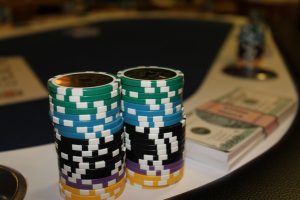 To take control of the stories we tell ourselves, we need to harness certain mental beliefs. This would simply be a perspective or interpretation through which reality is viewed. Such beliefs are especially important in poker (and in life), so let's examine them more closely.
To take control of the stories we tell ourselves, we need to harness certain mental beliefs. This would simply be a perspective or interpretation through which reality is viewed. Such beliefs are especially important in poker (and in life), so let's examine them more closely.
Let's start with the most banal example – a half glass of water. You can see this glass as half full or half empty, depending on the prevailing beliefs in your mind. The simplest shift in interpretation fundamentally changes a person's view of this glass.
In the same way, self-awareness also heavily relies on these mind-limiting beliefs. A downswing will simply create new mental limitations, e.g., “I am completely unlucky, I am being punished when I should be rewarded, I don't deserve this, I will spiral down, I am losing money,” etc. Thus, emotions are linked with labels, the victim role, and decline.
But we can reverse this perspective by also using mental beliefs. Using the exact same set of facts, we can interpret and contextualize them in a way that benefits us. For example, instead of thinking “I am being punished when I should be rewarded,” change it to “How I handle this downswing defines me as a poker player.” And the belief shifts from a label to a challenge. Instead of the belief “I don't deserve this,” the victim role, change it to “Everyone experiences downswings, this is mine, I knew it would eventually come, and here it is” – an acceptance belief. We can also deal with the decline belief “I am spiraling down” by changing it to a progress belief “I am improving thanks to this downswing.”
The combination of the last two beliefs is sometimes called the fog of variance. It is very powerful in dealing with a downswing. One of the reasons why it is so difficult when a downswing hits is that we believe we are the only ones being unfairly punished. No matter what we do or how well we play, when the downswing period comes, it seems that poker is punishing us and only us.
In poker, there are two competing ideas describing variance: the first is that we alone create our graphs, and the second is that we are victims of variance whims. People often oscillate between these two theories without truly choosing one (and the truth lies somewhere between these two ideas). But the most useful approach would be to fully embrace both.
Instead of imagining poker as a monolithic entity treating one person fairly and another unfairly, let's imagine variance as isolated for each person. When you face a downswing, instead of thinking “It's unfair that poker chose me to punish with a downswing,” think “This downswing was inevitable. This is my part of the mountain. Eventually, I had to face a downswing of this size and duration, so it's happening now.”
Just like climbing a mountain, seeing that the next segment of the mountain will be particularly difficult and time-consuming. Does the climber curse and say, “I don't deserve this part of the mountain, it's unfair that the mountain treated me this way”? Of course not. For the climber, it's just part of the mountain. It would be foolish to climb a mountain if you plan to remove the toughest parts. So why is it different in poker?
It seems different in poker because somewhere in our minds we carry the belief that we shouldn't experience downswings. Everything could be different. Variance could simply choose to be kind to us.
In fact, there is some truth in such thoughts. Variance simulators, forum posts show great graphs, and all those Cinderella stories confirm the idea that if poker were kind enough to us, everything would be much simpler. However, while technically true, such a perspective, such a belief can be particularly harmful.
We need to choose the variance beliefs discussed earlier. We need to imagine,  that our variance graph is already drawn in advance. There is no new momentary decision or trickery. The variance that awaits us is like a mountain we have already started climbing. We cannot yet see the variance we will face; it is still covered by a fog curtain. But despite this, we must understand that it will be here, that it is simply part of what poker is, and that we must accept it from the moment we decide to play poker.
that our variance graph is already drawn in advance. There is no new momentary decision or trickery. The variance that awaits us is like a mountain we have already started climbing. We cannot yet see the variance we will face; it is still covered by a fog curtain. But despite this, we must understand that it will be here, that it is simply part of what poker is, and that we must accept it from the moment we decide to play poker.
There is only one problematic mental belief, and that belief is related to money: “I am losing money.” You might immediately think: “How can I change this? If I am losing, it is a fact. I can't deceive myself in such a place.” Let's think for a minute about how we define downswings. If a particularly edgy player loses everything in a week, he might declare, “This week I had a downswing.” But to whom? Notice, such a person defines the starting point at the beginning of the week. Now imagine he wins for three weeks before that. Why do we agree that he had a week-long downswing? Why don't we say it lasted two weeks? Or three? Four? It is very subjective to determine the starting point in our self-awareness.
So, if your lifetime graph was rising and suddenly started to decline last month, why do you decide that a downswing has begun? Why not choose instead that you experienced wins for the last four months? Or even more – that you have experienced a continuous rise since the beginning of your career?
Such a mental belief could be called “one long session.” Because it is very subjective to decide where what we call a downswing begins and ends. Once we understand this, we can decide for ourselves where we want to draw the lines. And then let's choose the start of our career. Thus, every session played will not be the one where you reached a new upswing or downswing. You are simply in a continuous flow that you started when you began playing and that will continue throughout your poker career. You don't even need to take responsibility for certain days, weeks, or months when you were a good or bad player. You are completely free from such a burden. You no longer need to experience fluctuations as separate, bringing pain or glory. Instead, you can accept the whole story, from beginning to end.
Sounds nice, right? Easier said than done. Can you truly accept everything as it is? Can you sit and think after a series of losses: “Well, my poker career is developing quite well anyway”? Of course, it is not easy. However, this skill can be developed through sincere and conscious practice.





